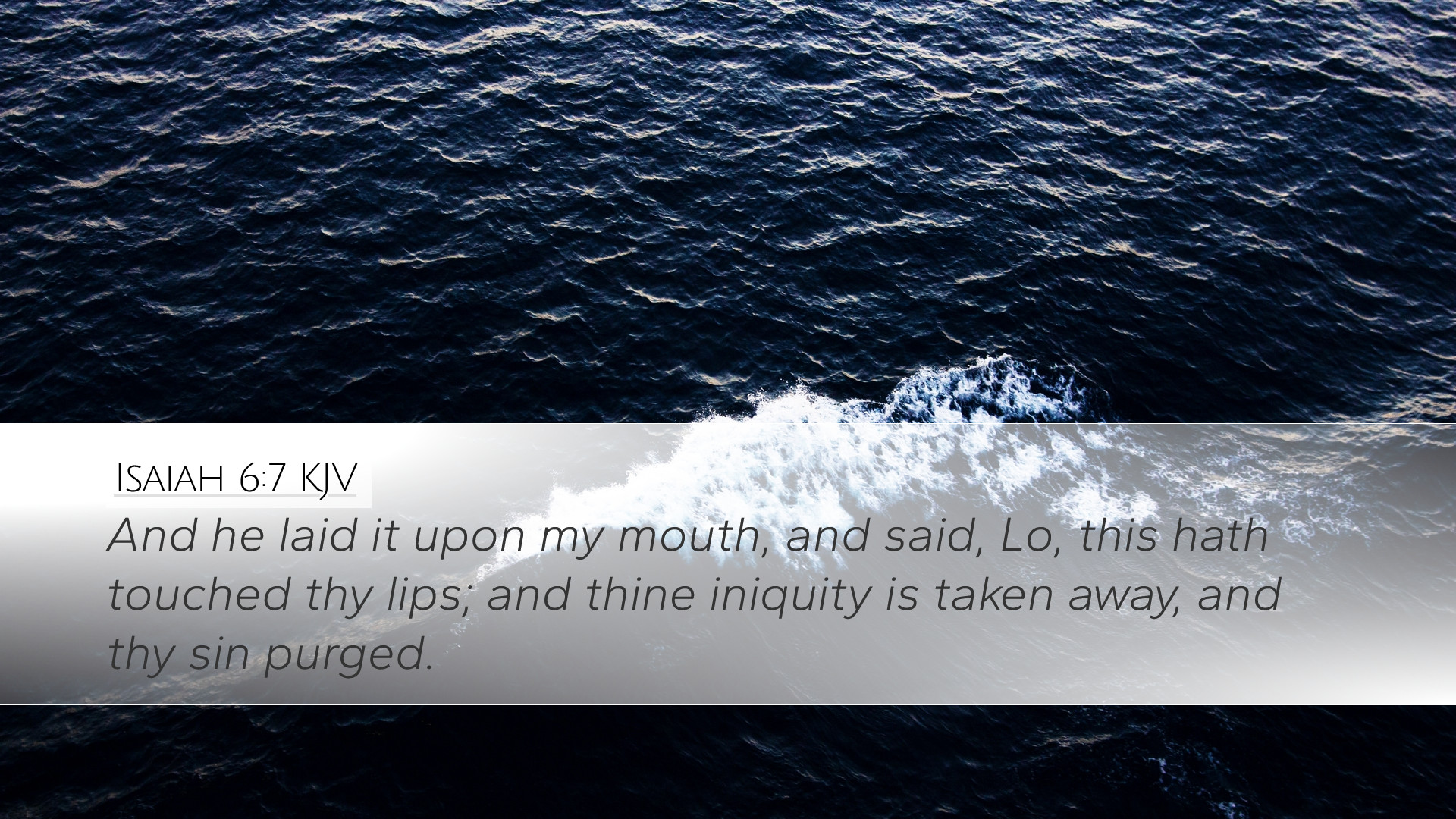Commentary on Isaiah 6:7
Isaiah 6:7 reads: "And he laid it upon my mouth, and said, Lo, this hath touched thy lips; and thine iniquity is taken away, and thy sin purged." This verse captures a pivotal moment in the prophetic ministry of Isaiah, representing the profound themes of purification, divine grace, and the readiness for service. Drawing from the esteemed public domain commentaries, we delve into the insights from Matthew Henry, Albert Barnes, and Adam Clarke to enrich our understanding of this text.
Contextual Analysis
Before we delve deeper into verse 7, it is essential to understand the context surrounding it. The vision of God’s holiness in chapter 6 sets the stage for Isaiah's commission as a prophet. The seraphim, with their cries of "Holy, holy, holy," reveal the majesty and holiness of God, establishing a stark contrast to the sinfulness of humanity. Isaiah’s vision leads him to a profound realization of his own unworthiness:
"Woe is me! for I am undone; because I am a man of unclean lips, and I dwell in the midst of a people of unclean lips" (Isaiah 6:5).
Divine Purification
In responding to Isaiah's acknowledgment of his sinfulness, the seraph demonstrates God's readiness to cleanse. Matthew Henry notes the significance of the coal taken from the altar, indicating that God's judgment is tempered with mercy. The act of touching Isaiah's lips symbolically signifies the purging of his sin:
- Symbol of Cleansing: The coal represents the refining fire of God's holiness, exemplifying how divine touch can purify even the most sinful.
- Iniquity Taken Away: This emphasizes that God is not merely pointing out sin but actively removing it through grace.
The Role of the Prophet
Albert Barnes emphasizes the transformation that occurs in Isaiah’s life with this act of divine cleansing. Following the purging of sin, Isaiah is now ready to fulfill the prophetic commission. This transition from unworthiness to calling reflects a pattern seen throughout scripture, where God prepares His messengers:
- Preparation for Ministry: Henry mentions that purification precedes effective ministry. Isaiah could not carry out his mission without first experiencing personal cleansing.
- Significance of the Lips: Clarke highlights the importance of the lips, which represents the power of speech. The lips that were once unclean are now made fit to proclaim God’s message.
Theological Implications
This passage is deeply theological, presenting the necessary steps before engaging in God's work. The act of God touching Isaiah's lips signifies not just personal salvation, but also a holistic view of redemption:
- God’s Sovereignty and Grace: The seraph’s obedience in touching Isaiah reflects divine sovereignty. Clarke notes that it is not man who initiates purification; it is God who acts first.
- Transformation for Service: Isaiah’s transformation functions as an archetype for believers. Just as he was cleansed and sent, Christians today are called to experience the grace of God before ministering to others.
Application for Believers
For pastors, students, theologians, and Bible scholars, the implications of Isaiah 6:7 are far-reaching:
- Pursuit of Holiness: The call for personal holiness remains crucial. Just like Isaiah, believers today are invited to confess their sins and seek God's cleansing presence.
- Understanding Divine Calling: The transition from unclean to commissioned prophet encourages believers to embrace their calling despite past failures, trusting in God's sufficiency.
- Preaching with Authority: Knowing that their message is undergirded by the experience of grace empowers preachers to speak with authority and conviction.
Conclusion
Isaiah 6:7 serves as an illuminating example of God’s grace intersecting with human sinfulness. By touching Isaiah’s lips, God signifies the removal of iniquity—a divine act necessary for the prophetic mission ahead. Reflecting on this passage encourages deep spiritual introspection and an understanding that true ministry flows from a place of personal purification and readiness to serve according to God’s will. In recognizing the holiness of God and the cleansing that He provides, believers can boldly approach their call to proclaim the truth, equipped by the grace they have received.


